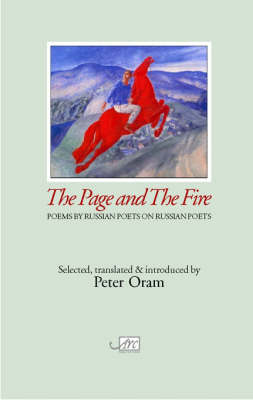Arc Translations
1 total work
The Page and the Fire
by Anna Andreevna Akhmatova, Marina Tsvetaeva, and Yevgeny Aleksandrovich Yevtushenko
Published 7 August 2007
The early years of the twentieth century saw a remarkable flourishing in the life of Russian poetry. The so-called symbolist movement had reached a kind of culmination with Alexander Blok, but out of its embers there arose a number of energetic poet-groups, each with its own bright stars and lesser satellites, its own principles and manifestos, its own self-important label. Acmeism, Futurism, Ego-Futurism, the Centrifuge...if one thing was common to these widely differing movements it was an urge to put aside the deliberate obscurity, the ambiguity and the mystic pretensions that had become the poetic vogue, and replace them with a new linguistic honesty and directness. These cliques would, though, be of little interest to us today, had they not fostered the early development of poets of such stature as Akhmatova, Mandelstam, Mayakovsky or Pasternak.At a time in Russian history like no other, with its tumultuous changes on the largest scale, and its high ideals that would soon dissolve into disillusion, repression and terror, it is perhaps not surprising that the various practitioners of what is essentially a solitary art should be particularly aware of one another's existence and activities, and that there should be a mutual nurturing of common bonds.
This may at least partly explain the unusually high incidence, in the works of the major figures, of poems to, about, or in memory of other poets of the time. It is a selection of such verse that this book presents, together with some examples of the same tradition as it continues through the subsequent decades. It is by no means exhaustive, and in many cases a poem included is only one of a whole cycle of poems by the same writer to the same recipient.Such a monothematic anthology might prove a tedious read, were it not for the first-rank quality of the poets and their highly differentiated voices. Compare the almost classical yet thoroughly modern purity of Mandelstam with, say, the electric vitality of Tsvetaeva, Mayakovsky's thundering rhythms and colloquialisms with Pasternak's restrained quatrains and unexpected metaphors, or Severyanin's pitiless irreverence with Akhmatova's simple, acutely sensitive profundity.Where there are a number of items addressed to one poet, it is illuminating to witness the various perceptions, as they contrast with or corroborate one another, and so build up a three-dimensional picture of the individual concerned.
Several of the examples are in memoriam, and it is a tragic fact that many of these lives were to end in suicide, execution, or a wretched death in exile. This collection reflects and confirms an inextinguishable vitality in Russian poetic life and the unshakeable faith of the Russian poet in the written word.
This may at least partly explain the unusually high incidence, in the works of the major figures, of poems to, about, or in memory of other poets of the time. It is a selection of such verse that this book presents, together with some examples of the same tradition as it continues through the subsequent decades. It is by no means exhaustive, and in many cases a poem included is only one of a whole cycle of poems by the same writer to the same recipient.Such a monothematic anthology might prove a tedious read, were it not for the first-rank quality of the poets and their highly differentiated voices. Compare the almost classical yet thoroughly modern purity of Mandelstam with, say, the electric vitality of Tsvetaeva, Mayakovsky's thundering rhythms and colloquialisms with Pasternak's restrained quatrains and unexpected metaphors, or Severyanin's pitiless irreverence with Akhmatova's simple, acutely sensitive profundity.Where there are a number of items addressed to one poet, it is illuminating to witness the various perceptions, as they contrast with or corroborate one another, and so build up a three-dimensional picture of the individual concerned.
Several of the examples are in memoriam, and it is a tragic fact that many of these lives were to end in suicide, execution, or a wretched death in exile. This collection reflects and confirms an inextinguishable vitality in Russian poetic life and the unshakeable faith of the Russian poet in the written word.
